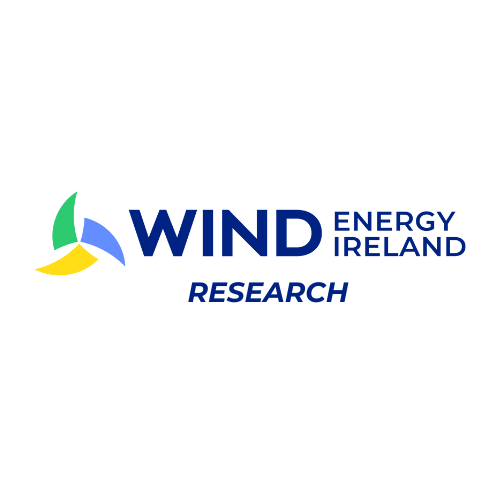Wind Energy Ireland's Annual Research Poster Event 2025
WEI Research are thrilled to host our annual research poster event during the WEI Annual Conference at the Clayton Burlington Hotel in Dublin on 16-17 January 2025. This initiative offers students and researchers a distinctive platform to display their work and interact with leading industry stakeholders.
Come meet the poster presenters!

We would like to invite you to visit our dedicated Research Poster Room, where you can explore a diverse range of topics, including technology, economics, ecological impacts, and more (see table below for a list of posters and presenters). This is a unique opportunity to connect with the authors, delve deeper into their work, and engage in meaningful discussions. The posters will be on display throughout the event, with dedicated networking sessions [click here for the agenda] allowing you to meet the presenters directly. Don’t miss the announcement of prizes for the best poster presentations, which will take place on Day 1 of the conference following Session 3.
We look forward to welcoming you!
Selected Poster Titles, Authors & their Organisation:
Offshore Renewable Energy Development in Ireland: Planning Permission |
Fulya Islek |
UCD |
Enhancing Offshore Wind Turbines: The Role of Cerium Coating in Corrosion Protection |
Farzaneh Khast |
Amirkabir University of Technology - Tehran Polytechnic |
Sustainability in Education: The wind of change in Higher Education Institutions |
Juanita Blue |
Atlantic Technological University |
Investigation of Erosion Resistance of Viscoelastic Coatings for Wind Turbine Blade Applications |
Mohammadhassan Badihehaghdam |
South East Technological University |
How offshore wind curtailments can power the future green hydrogen economy |
Charlene Vance |
NexSys |
How much damage can rain induce on wind blade coatings? |
Dylan S. Edirisinghe |
South East Technological University |
What Are the Key Properties of Sol-Gel Coatings for Enhancing Water Droplet Erosion Resistance on GFRP Composites? |
Manasa Hegde |
South East Technological University |
Integrated Design Approaches for Sustainable Commercial Floating Wind Farms |
Mitra Kamidelivand |
UCC |
Preparation is Optional: Using Real Options to Estimate the Value of Preparation Works Before Building, Extending or Repowering a Wind Farm |
Peter Deeney |
UCC |
Enhancing Surveyor Accuracy in Bird Flight Height Estimation: Implications for Wind Farm Collision Risk Assessment |
Nicola Largey |
MKO Research |
Multi-Criteria Decision-Making and Constrating Mapping supporting Irish West Coast Offshore Floating Windfarm Development Options |
Jason McFadden |
UCC |
Can Unsupervised Machine Learning Enhance Measure-Correlate-Predict for Faulty Anemometer Detection? |
Juan Albarracin |
University of Limerick |
How Can Numerical Analysis Inform Biomimetic Coating Design for Biofouling Mitigation in Wind Turbine Applications? |
Samira Nazari |
South East Technological University |
Estimating Wind Turbine Blade Fatique of NREL 5MW offshore reference turbine |
Theodoros Varouxis |
UCD |
The preliminary design of suction caisson anchors for cloating offshore wind turbines |
Emma Gallagher |
Trinity College Dublin |
Can Earth Observation Satellites be Used to Assess Site Suitability for Onshore Wind Developments? |
Conor Doyle |
TechWorks Marine |
Anomaly Detection of Scour around Offshore Monopile Foundation |
Mahmoud Abdelhak |
UCD |
Generative AI-based data augmentation for improved bioacoustic classification in noisy environments |
Anthony Gibbons |
Maynooth University |
Feature Selection for Unsupervised Defect Detection of a Wind Turbine Blade Considering Operational and Environmental Conditions |
Mohadeseh Ashkarkalaei |
UCD |
Investigation of leading edge erosion aerodynamics and mitigation strategies |
Hugh Irving |
UCD |
Proudly sponsored by:

THE CALL FOR ABSTRACTS IS NOW *CLOSED!*
Present Your Research at the WEI Annual Conference!
Have you been working on ground breaking research in wind energy and its associated technologies? Here's your chance to showcase it!
Selected abstracts will have the opportunity to:
- Present a Poster: Highlight your work in our dedicated poster exhibition room, centrally located for maximum visibility.
- Win Big: All posters will be evaluated during the event, with the best poster earning a special recognition and awarded on the main stage.
- Enjoy Complimentary Access: Authors of selected abstracts will receive free access to the entire two-day WEI conference. (Note: Travel and accommodation costs are not covered.)
Who Can Apply?
- We invite submissions from researchers and students at all levels — undergraduate, master's, doctoral, and post-doctoral — across diverse disciplines including engineering, economics, social sciences, and environmental sciences.
- Submit high-quality scientific abstracts, which address challenges and opportunities in the development of wind energy and associated technologies.
- Abstracts should be uploaded through the form below.
- Abstracts are to be a maximum 2 pages in length. Text no smaller than 10 pt is to be used in the main body, 9 pt in captions and 22 pt in the title. The use of images to summarise your work is encouraged, but do not exceed the 2-page limit!
- A panel will evaluate abstracts and establish which submissions are accepted for the event, abstracts will be scored on novelty, impact, and communication.
